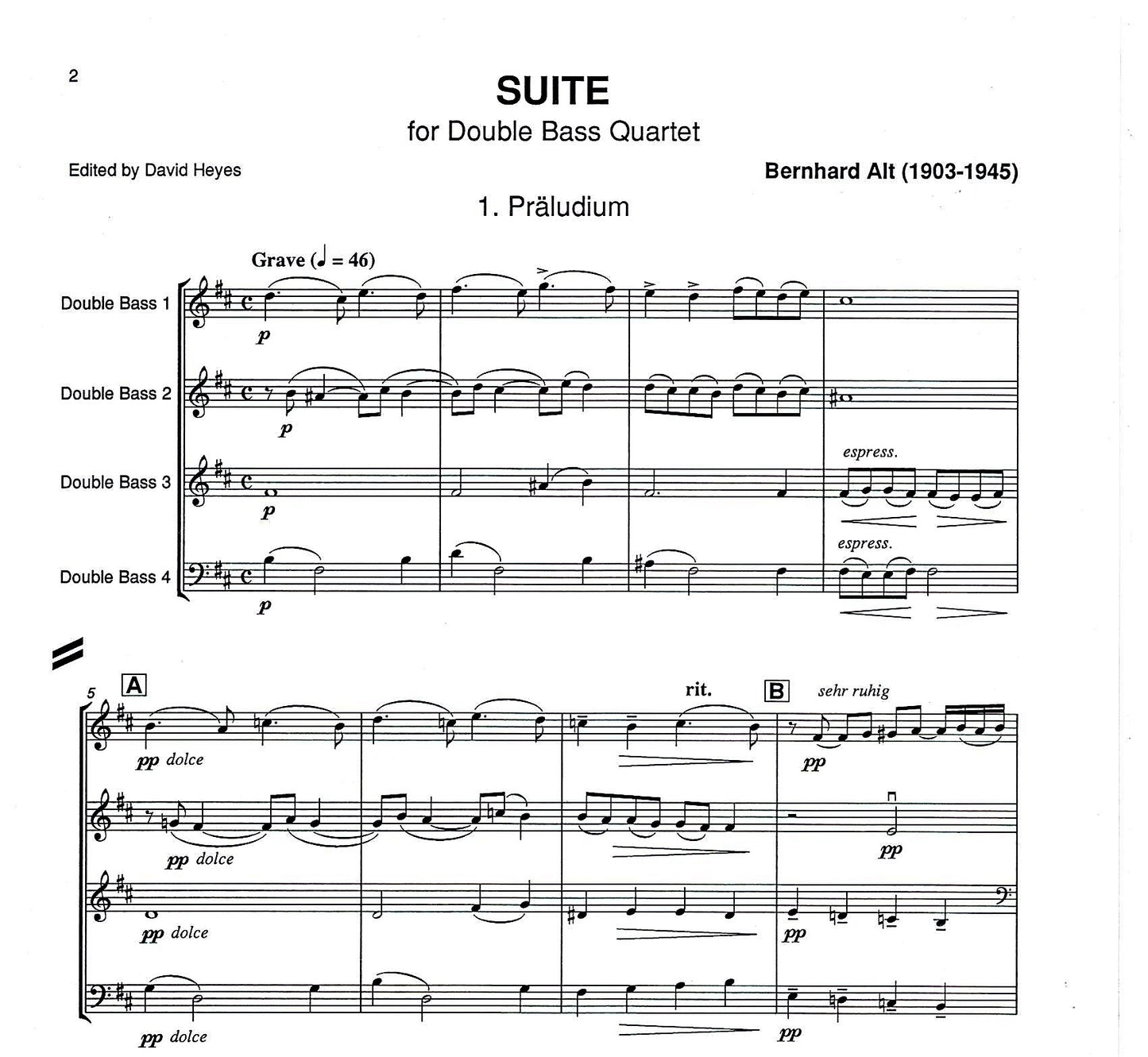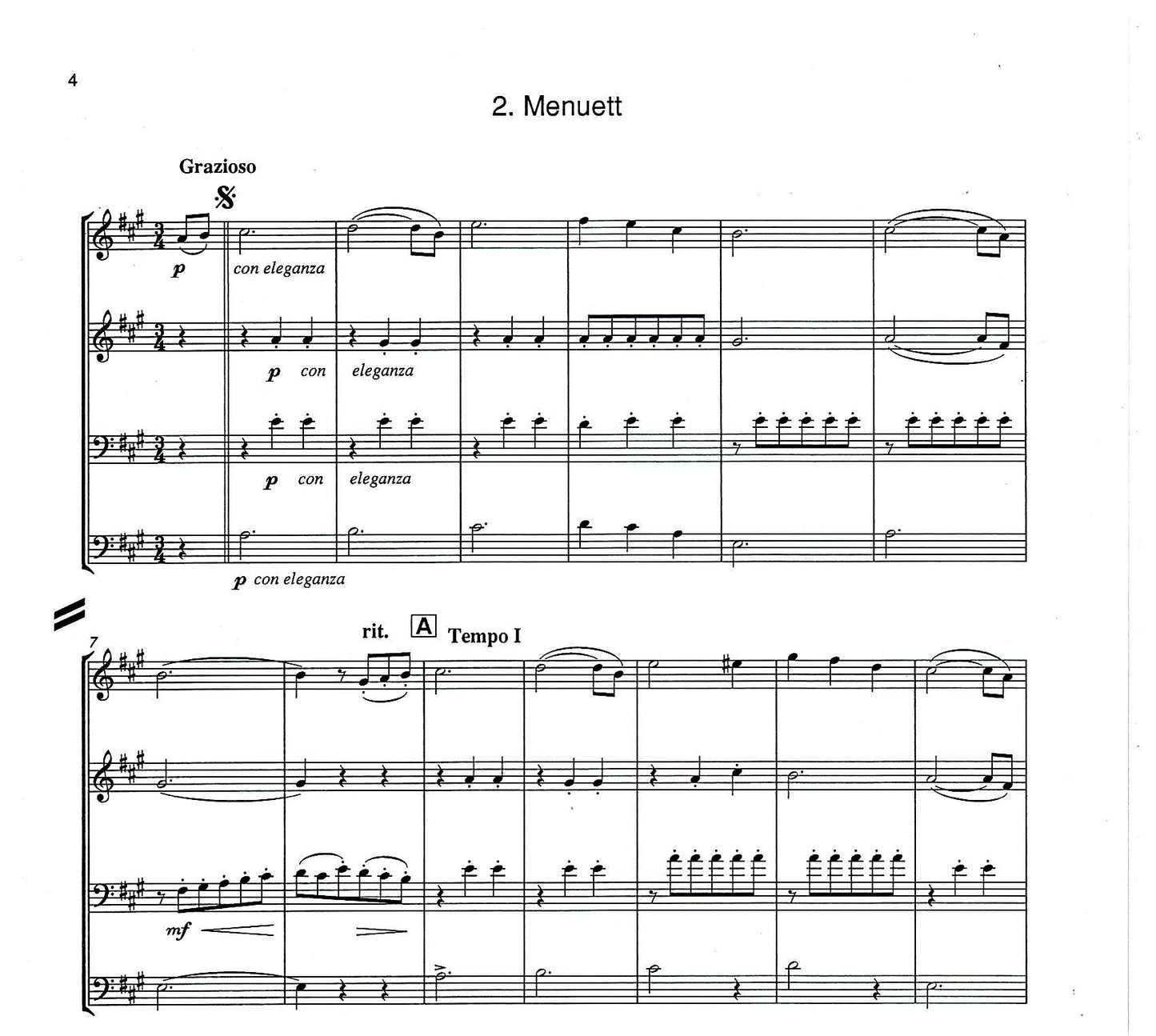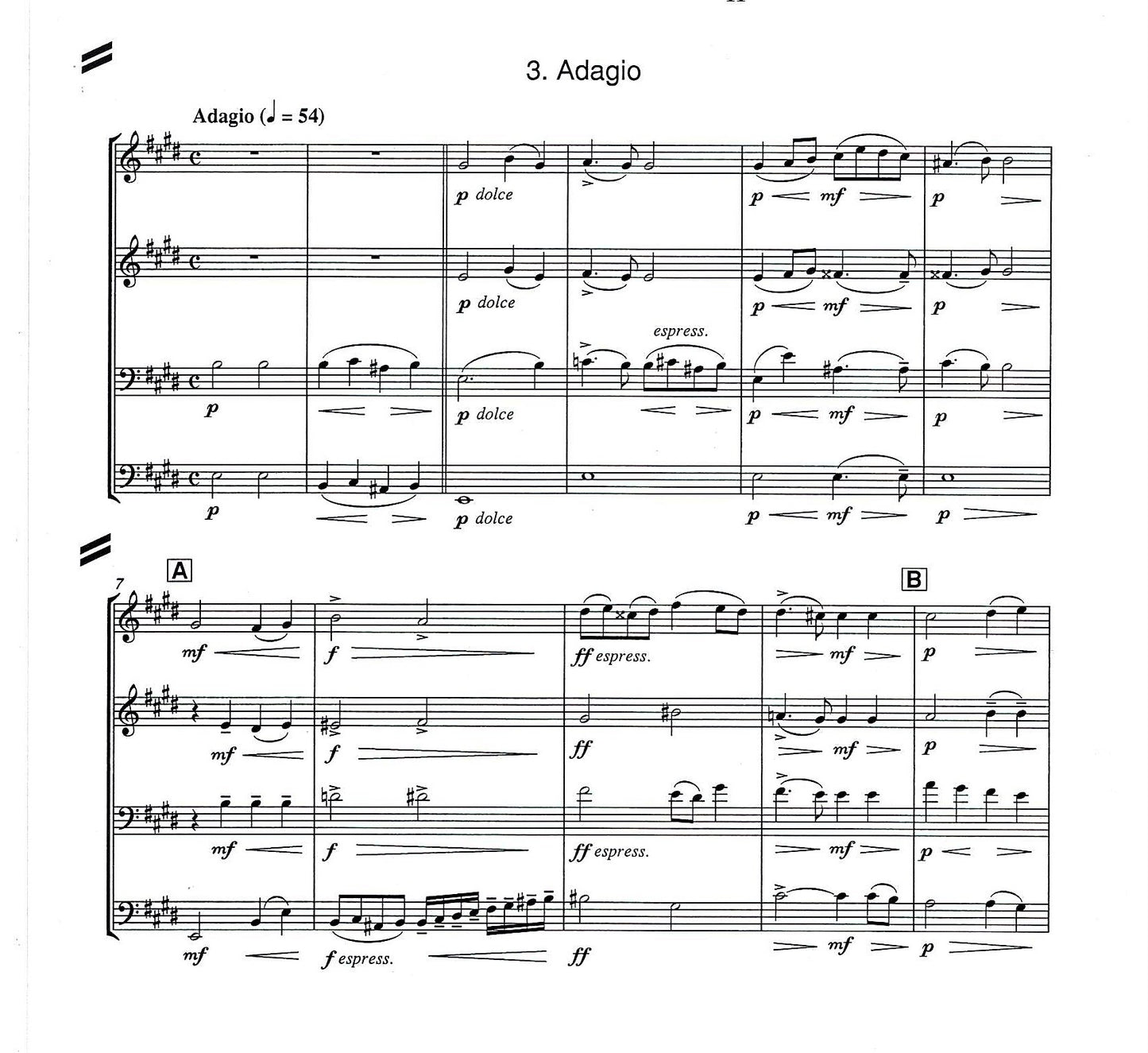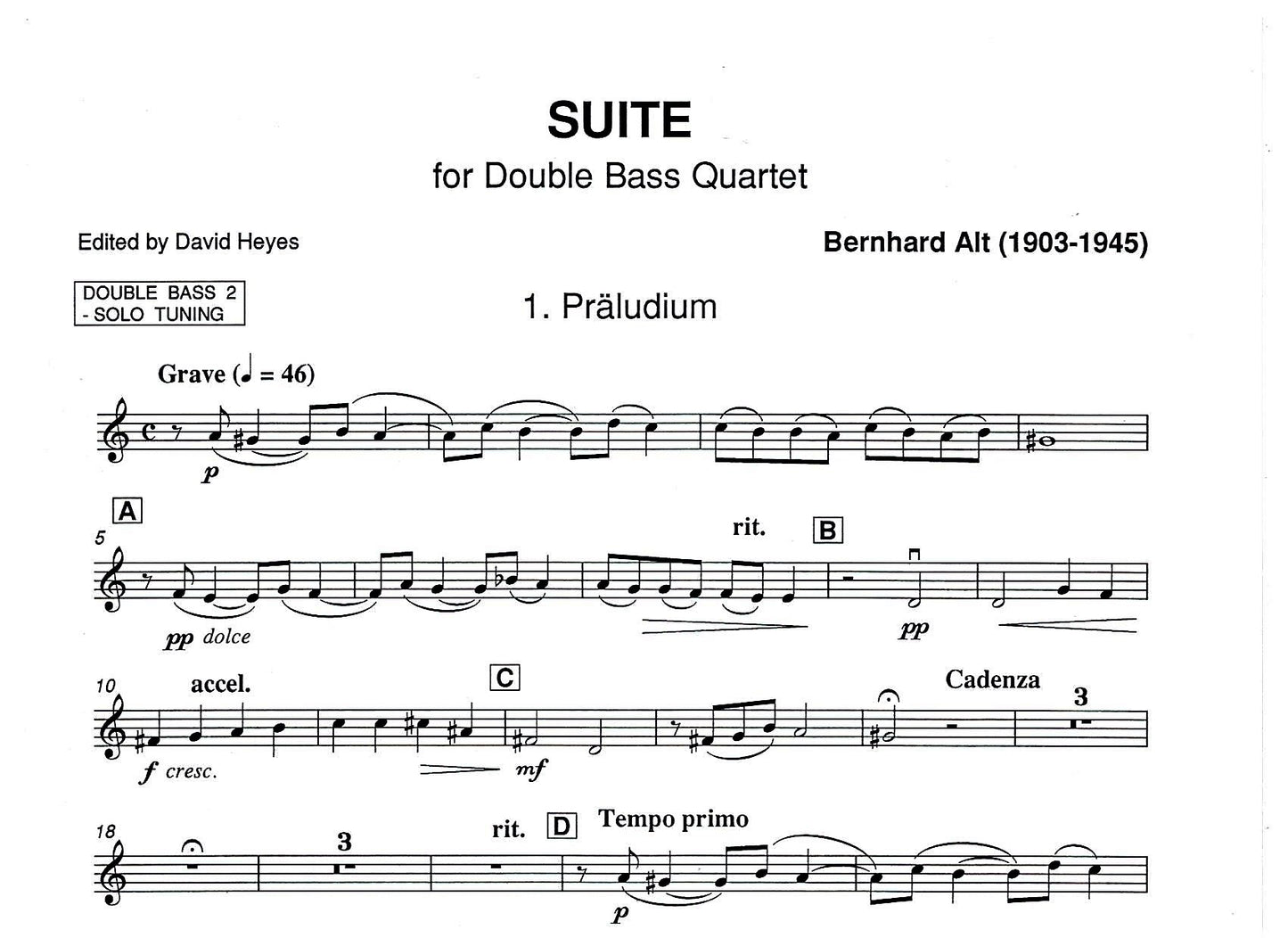David Heyes
Bernhard Alt: Suite for double bass quartet
Bernhard Alt: Suite for double bass quartet
Couldn't load pickup availability
About the Composition
Bernhard Alt’s Suite is fun, stylish, charming, elegant and rhythmic, and would have been a revelation to audiences in the 1930s. Alt composed music which is always entertaining, with no movement outstaying its welcome, and is an effective, accessible and light-hearted addition to any quartet programme, even into the 21st-century.
The musical styles may be slightly out of date in the more sophisticated 21st-century, but this is still a great study or recital piece for students to develop a range of ensemble and musical skills with also has much to commend it for the advanced or professional quartet.
The Suite is in four contrasting movements and lasts around 12-13 minutes. The opening Präludium is slow and stately and has a slow moving chordal accompaniment with gently shifting harmonies and an upward moving theme for bass 1, which eventually develops into a solo cadenza employing several effective double stops, before the opening theme is restated but with a staccato accompaniment, slowly dying away to an octave unison B.
A gentle and elegant Menuett follows, with a simple and lilting waltz theme which is played by bass 1. A brief three bar interlude, played entirely in harmonics, makes excellent use of the two tunings, before leading into a more urgent and rhythmic middle section and a staccato feel which beautifully contrasts the easy going return of the opening theme.
The third movement (Adagio) is probably the emotional heart of the suite and, while the other movements are more characteristic in style this has more depth and drama and is also the longest of the four. Essentially a 'song without words', bass 1 is accompanied by the other basses, often in rhythmic unison but with the occasional flourish to add interest and variety. There is scope to explore a wide range of colours and timbres and to exploit the lyrical and sonorous qualities of the double bass quartet medium.
A lively and rhythmic Humoreske is fun and light-hearted, although the Trio is slower and tranquil, creating an even greater contrast with the bucolic opening and closing music. No great emotional depths are plumbed here, but the music is well written for four basses and there is scope for the players to shine and show off their lighter and more humorous capabilities and sensibilities
Bernard Alt and Arcady Dubensky, two names probably only known amongst bassists, composed the first two double bass quartets. The Alt quartet was premiered and published in 1933, although it is unknown if it was written that year, and Dubensky's work was completed on 16 May 1933 in New York, although it is unknown when it was premiered and had to wait for almost 80 years before it was published.
Which was written first? We will probably never know, but both are interesting and inventive works in their own right, and were a good and positive start for a medium which has flourished and developed immeasurably throughout the second half of the 20th-century. Interestingly, both composers were also violinists and each wrote for double bassists in their orchestra - Alt for the Berlin Philharmonic and Dubensky for the New York Philharmonic.
Tuning
Basses 1 & 2 play in solo tuning - Basses 3 & 4 play in orchestral tuning
About the Composer
Bernard Alt is little known today even amongst bassists, and information about him is scant, but published details state that he was born on 7 April 1903 in Silesia and studied violin at the Stern Conservatoire and the Hochschule fur Musik in Berlin. Apparently he also studied violin privately with Paul Juon and Alfred Wittenberg (1928-1945), and joined the Berlin Philharmonic Orchestra as a first violinist.
Alt composed a number of works for his Philharmonic colleagues, including suites for trombones and flutes, and his four movement Suite for double bass quartet is probably still the work by which he is best known. Bernhard Alt died on 7 February 1945 in Berlin.
Klaus Stoll writes: "...Four members of the already widely celebrated double-bass section of the Berlin Philharmonic gave the Suite its first performance in 1933. The great success of this occasion encouraged the ensemble to give many more performances, including some in the Berlin Philharmonic's subscription concert series, and inspired other composers to write similar works." The performers were Linus Wilhelm, Herrmann Menzel, Alfred Kruger and Arno Burckhardt. There was no template for a double bass quartet in the 1930s, although many examples of cello quartets existed, and both Alt and Dubensky pursued different paths to solve the same problems.
The four stringed bass, tuned in fourths, favours a number of keys particularly in the higher registers, and Alt's solution, probably informed and inspired by his double bass colleagues, was to use two tunings - basses 1 and 2 are in solo tuning and basses 3 and 4 are in orchestral tuning. Th.A. Findeisen also used the same tunings a year later in Leipzig, but Dubensky favoured a single tuning, again probably decided by his New York Philharmonic bass colleagues, and both ideas are eminently workable and successful.
One other issue is the problem of the generally low tessitura of the double bass quartet and Alt uses an S.A.T.B. approach, with each bass inhabiting its own particular register, ensuring clarity and space between the four parts. There are many ways to write successfully for double bass quartet, and many ways to exploit the unique characteristics of the instrument, and the works by Alt, Dubensky and
Findeisen have spawned a wealth of amazing and inventive works over the last 80 years.
Commentary
"Alt's thinking about how four basses might work together is expressed in a warm, post-Brahms style, and cast in four neo-classical movements. The Preludium strikes a serious, even melancholic pose; the Menuet juxtaposes beer-hall oom-pah-pahs with high, tight chords and a darker section; the richly harmonized Adagio glows warmly; the Humoreske revels in textural contrasts. Alt exploits the full range of the instrument and standard techniques - the melody in harmonics over the top of the Humoreske, for example - and his music here is direct in form and content. It is lyrical, with clearly defined foreground and background, but even the accompaniments are eloquent and the ensemble interaction sure." [John Henken]
It is important to remember and celebrate our rich heritage and, whilst the likes of Schoenberg, Stravinsky and Shostakovich were ploughing a different and more challenging furrow, there is still space for the music of Alt and the early pioneers of the double bass quartet and an opportunity to remember a far gentler style, time and pace of life. Music to enjoy rather than to challenge there is nothing wrong with that... [David Heyes]












